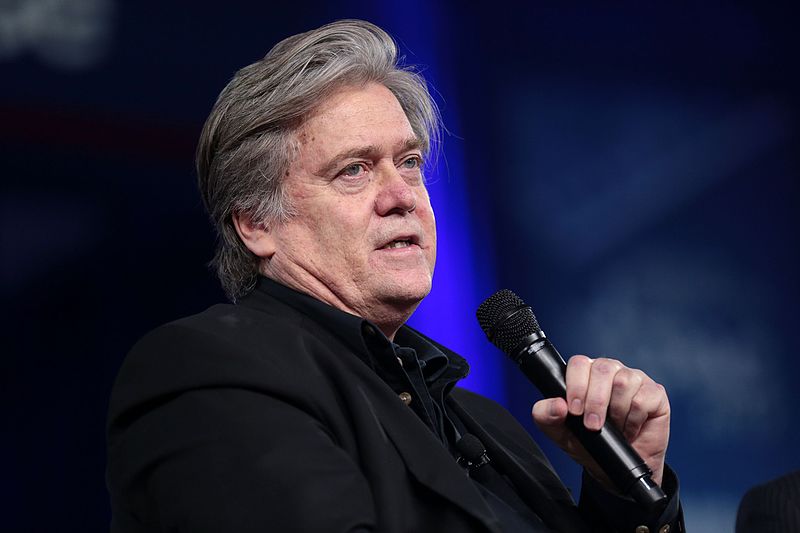At the boundary 2 website, Joseph S. O’Leary takes stock of Steve Bannon’s tenure as chief strategist to President Donald Trump, a position from which he was recently fired after six months. O’Leary suggests that Bannon achieved more of his ultra-right agenda that it might seem, and argues that his vague ideological commitments are more of an asset than a liability. Read an excerpt from the piece below, or the full text here.
Bannon is a simpler figure than Trump, yet a more elusive target, because of his silence and invisibility, based on his policy that “darkness is good” and “I am not doing media,” which, along with his reputation as an intellectual and a cogent thinker, lends him inscrutable dignity. The White House, a “dump” according to its present occupant, is said to be haunted, and Bannon loomed there rather spectrally. He did not provide the Trump presidency with a backbone or a secure framework, a task that has defeated even the “axis of adults” now surrounding the incumbent—Generals John Kelly, James Mattis, Joseph Dunford, and H. R. McMaster, along with Secretary of State Rex Tillerson. An opportunistic ectoplasm, Bannon made his influence felt as occasion offered. One can imagine him overawing his presidential protégé by a pregnant silence, or dropping laconic counsels at well-chosen moments into the depths of the presidential mind. Flourishing amid the insubstantiality and surreal evanescence of a White House that had become a reality show, that is, an unreality show, Bannon could inject a series of reactionary prompts on such matters as ecology, immigration, the transgender ban, the Iran nuclear agreement, the war in Afghanistan. One wonders how he would guide the unsteady finger that hovers over the nuclear button.
This dignified eminence began to be punctured toward the end of his tenure, when Bannon flickered into eerie prominence in Anthony Scaramucci’s job-ending interview with a reporter he later compared with Linda Tripp. Scaramucci’s fantastical image of an auto-fellator exploiting the president’s strength to boost his own brand, and his gangster-style threats: “The president knows what he’s going to do” and “has a very good idea of the people that are undermining his agenda,” were good for a laugh, but the threats turned out not to be idle ones, though Scaramucci’s own head rolled before Bannon’s. Then came a second lurid flare: Bannon’s own astonishing interview with The American Prospect, seemingly a hasty effort to express his views forcefully while he still had the White House position he knew he was doomed to lose within days. He used the opportunity to focus not on Islam, but on Asia, now apparently a more real threat: “We’re at economic war with China. It’s in all their literature. They’re not shy about saying what they’re doing. One of us is going to be a hegemon in 25 or 30 years and it’s gonna be them if we go down this path.” Contrary to Trump’s threat of “fire and fury” to North Korea, Bannon said: “There’s no military solution, forget it. Until somebody solves the part of the equation that shows me that ten million people in Seoul don’t die in the first 30 minutes from conventional weapons, I don’t know what you’re talking about, there’s no military solution here, they got us.” When Bannon actually speaks, he is emphatic and grandiose; but when his words are no longer backed by the title of Chief Strategist they will lose most of their weight.
Image of Steve Bannon via boundary 2.
